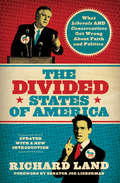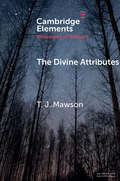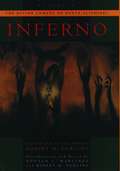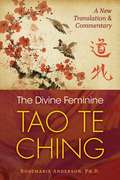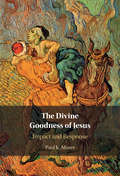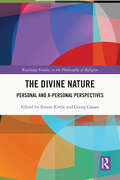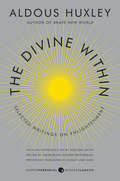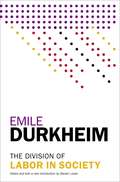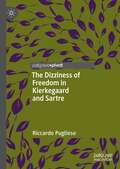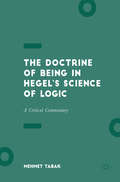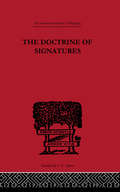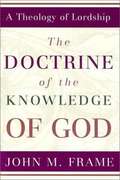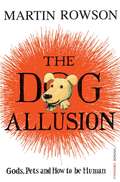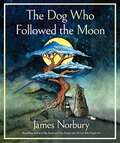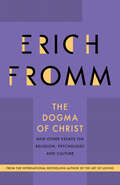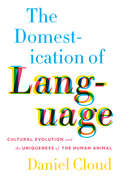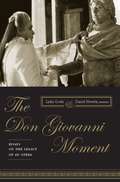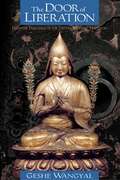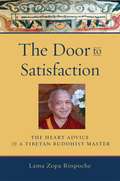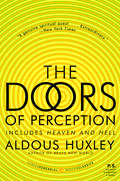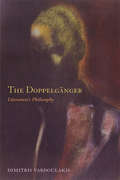- Table View
- List View
The Divided States of America
by Richard LandWhat's God Got to Do with America?Turn on a cable news show or pick up a news magazine, and you get the impression that the United States of America is really the Divided States of America, a country politically and ideologically at odds, with one side staring down the other across an unbridgeable chasm.According to Dr. Richard Land, we need a new way of thinking about ourselves. The differences that divide us are real, he argues, but we can still find common ground. Our differences do not make it impossible to find constructive ways to discuss the role of God and religion in America's public agenda. In this insightful and timely book, Dr. Land shows the way."One of the clearest, most tightly argued, and informative accounts of religion in the public square today. . . ." ?Madeleine Albright, former U.S. Secretary of State"A lucid statement of a reasonable position on the place of religion in public life. While the author writes from a commmitted, evangelical standpoint, his views on church/state relations will be plausible to many who do not share his religious commitment." ?Michael Novak, American Enterprise Institute
The Divided World: Human Rights and Its Violence
by Randall WilliamsTaking a critical view of a venerated international principle, Randall Williams shows how the concept of human rights—often taken for granted as a force for good in the world—corresponds directly with U.S. imperialist aims. Citing internationalists from W. E. B. Du Bois and Frantz Fanon to, more recently, M. Jacqui Alexander and China Miéville, Williams insists on a reckoning of human rights with the violence of colonial modernity. Despite the emphasis on international human rights since World War II, Williams notes that the discourse of human rights has consistently reinforced the concerns of the ascendant global power of the United States. He demonstrates how the alignment of human rights with the interests of U.S. expansion is not a matter of direct control or conspiratorial plot but the result of a developing human rights consensus that has been shaped by postwar international institutions and debates, from the United Nations to international law. Williams probes high-profile cases involving Amnesty International, Nelson Mandela, the International Lesbian and Gay Human Rights Commission, Abu Ghraib, and Guantánamo, as well as offering readings of works such as Hotel Rwanda, Caché, and Death and the Maiden that have put forth radical critiques of political violence. The most forceful contradictions of international human rights discourse, he argues, come into relief within anticolonial critiques of racial violence. To this end, The Divided World examines how a human rights–based international policy is ultimately mobilized to manage violence—by limiting the access of its victims to justice.
The Divine Attributes (Elements in the Philosophy of Religion)
by Tim MawsonThe Divine Attributes explores the traditional theistic concept of God as the most perfect being possible, discussing the main divine attributes which flow from this understanding - personhood, transcendence, immanence, omnipresence, omniscience, omnipotence, perfect goodness, unity, simplicity and necessity. It argues that the atemporalist's conception of God is to be preferred over the temporalist's on the grounds of perfect being theology, but that, if it were to be the case that the temporal God existed, rather than the atemporal God, He'd still be 'perfect enough' to count as the God of Theism.
The Divine Comedy of Dante Alighieri: Volume 1 Inferno
by Dante Alighieri Robert M. Durling Ronald L. MartinezThis is the first volume of a new prose translation of Dante's epic - the first in twenty-five years. Robert Durling's translation brings a new power and accuracy to the rendering of Dante's extraordinary vision of Hell, with its terror, pathos, and sardonic humour, and its penetrating analyses of the psychology of sin and the ills that plague society. A newly edited version of the Italian text can be on facing pages, and this edition includes fully comprehensive notes as well as sixteen essays on special subjects.
The Divine Feminine Tao Te Ching: A New Translation and Commentary
by Rosemarie Anderson• Restores the feminine essence of the Tao Te Ching as well as the simplicity and poetic undertones of the chapters • Offers commentary for each of the 81 chapters and key Chinese characters to reveal their profound wisdom • Translated from ancient silk and bamboo slip manuscripts, the oldest known copies of the Tao Te Ching • Paper with French flaps In this book, Rosemarie Anderson shares her discoveries of the Divine Feminine Tao alongside her original translation of the Tao Te Ching. Working from ancient silk and bamboo slip manuscripts, the oldest known copies of the Tao Te Ching, the author slowly translated all 81 chapters over the course of two years, allowing each section to reveal its intimate poetic and spiritual nature. To her surprise, she discovered that the Tao was unmistakably feminine, consistently referred to as &“mother,&” &“virgin,&” and the &“womb&” of creation. Anderson explains how the Tao is a feminine force, the Dark Womb of Creation, the Immortal Void renewing life again and again in ordinary times and in times of crisis. She offers commentary for each of the 81 chapters to help reveal their profound wisdom. The author also restores the chapters&’ simplicity and musical undertones, explaining how, in the original Chinese manuscripts, the text is poetic and rhymed because the Tao Te Ching was often recited or sung--yet most English translations are written in scholarly prose with long sentences and complex syntax. She shows how the great Tao&’s message of wei wu wei--&“act without acting&” and &“do without doing&”--offers a path of peace and well-being for ourselves and for our relationships with others and the earth, a path that arises from spontaneous action that seeks no gain for the self. Capturing the original feminine nature of this ancient text, Anderson&’s translation sheds new light on the esoteric wisdom contained within the Tao Te Ching and on the mystical feminine essence of the Tao.
The Divine Goodness of Jesus: Impact and Response
by Paul MoserIn this book, Paul Moser explores Jesus' role as God's filial inquirer and clarifies a method of inquiry regarding Jesus, one that offers a compelling explanation regarding his experiential impact and his audience's response. Moser's method values the roles of history and moral/religious experience in inquiry about him, and it saves inquirers from distorting biases in their inquiry. His study illuminates Jesus' puzzling features, including his challenging question for inquirers of him (Who do you say I am?), his distinctive experience of God as father, his reference to himself as 'the son of man', his attitude toward his suffering and death, his unique role in the kingdom of God, and his understanding of his allegedly miraculous signs and of his parables and good news. The book also makes sense of evidence for the reality and the main purpose of Jesus.
The Divine Milieu
by Pierre Teilhard De ChardinTeilhard de Chardin's The Divine Milieu expands on the spiritual message so basic to his thought. He shows how man's spiritual life can become a participation in the destiny of the universe. Teilhard de Chardin -- geologist, priest, and major voice in twentieth-century Christianity -- probes the ultimate meaning of all physical exploration and the fruit of his own inner life. The Divine Milieu is a spiritual treasure for every religion bookshelf.
The Divine Nature: Personal and A-Personal Perspectives (Routledge Studies in the Philosophy of Religion)
by Georg Gasser Simon KittleThis book is the first systematic treatment of the strengths and limitations of personal and a-personal conceptions of the divine. It features contributions from Jewish, Islamic, Chinese, Indian and naturalistic backgrounds in addition to those working within a decidedly Christian framework. This book discusses whether the concept of God in classical theism is coherent at all and whether the traditional understanding of some of the divine attributes need to be modified. The contributors explore what the proposed spiritual and practical merits and demerits of personal and a-personal conceptions of God might be. Additionally, their diverse perspectives reflect a broader trend within the analytic philosophy of religion to incorporate various non-Western religious traditions. Tackling these issues carefully is needed to do justice to the strengths and limitations of personal and a-personal accounts to the divine. The Divine Nature: Personal and A-Personal Perspectives will be of interest to scholars and advanced students working in philosophy of religion and philosophical theology.
The Divine Within
by Aldous HuxleyBrave New World author Aldous Huxley on enlightenment and the "ultimate reality"In this anthology of twenty-six essays and other writings, Huxley discusses the nature of God, enlightenment, being, good and evil, religion, eternity, and the divine. Huxley consistently examined the spiritual basis of both the individual and human society, always seeking to reach an authentic and clearly defined experience of the divine. Featuring an introduction by renowned religious scholar Huston Smith, this celebration of "ultimate reality" proves relevant and prophetic in addressing the spiritual hunger so many feel today.
The Division of Labor in Society (Contemporary Social Theory Ser.)
by Emile DurkheimRevised for the first time in over thirty years, this edition of Emile Durkheim’s masterful work on the nature and scope of sociology is updated with a new introduction and improved translation by leading scholar Steven Lukes that puts Durkheim’s work into context for the twenty-first century reader.When it was originally published, The Division of Labor in Society was an entirely original work on the nature of labor and production as they were being shaped by the industrial revolution. Emile Durkheim’s seminal work studies the nature of social solidarity and explores the ties that bind one person to the next in order to hold society together.This revised and updated second edition fluently conveys Durkheim’s arguments for contemporary readers. Leading Durkheim scholar Steve Lukes’s new introduction builds upon Lewis Coser’s original—which places the work in its intellectual and historical context and pinpoints its central ideas and arguments. Lukes explains the text’s continued significance as a tool to think about and deal with problems that face us today. The original translation has been revised and reworked in order to make Durkheim’s arguments clearer and easier to read.The Division of Labor in Society is an essential resource for students and scholars hoping to deepen their understanding of one of the pioneering voices in modern sociology and twentieth-century social thought.
The Dizziness of Freedom in Kierkegaard and Sartre
by Riccardo PuglieseThis book investigates the concept of freedom as it has been defined by Søren Kierkegaard and some of existentialism’s major figures, including Jean-Paul Sartre. In an attempt to delineate an ontology of the human condition, special emphasis is placed on the ideas of choice, responsibility, and transcendence. The second part of the book focuses on existential freedom in what has been its most radical formulation by Sartre. A translation of Il sentimento paralizzante del possibile. La vertigine della libertà in Kierkegaard e Sartre (2022), this book brings cutting-edge contemporary Italian philosophy to English readers.
The Doctrine of Being in Hegel’s Science of Logic
by Mehmet TabakThis book provides an accessible and thorough analysis of "The Doctrine of Being," the first part of Hegel's Science of Logic. Though it received much scholarly attention in the past, interpreters of this text have generally refrained from examining it in a sufficiently detailed manner. Through a rigorous and critical reading of Hegel's speculative arguments, Mehmet Tabak illustrates that Hegel meant his logic to be both a presuppositionless analysis and development of the basic categories of thought, on the one hand, and a post-Kantian ontology on the other. However, the analysis of the text demonstrates that Hegel fails to deliver such logic. This volume promises to be an indispensable guide to those who wish to understand the first book of Science of Logic.
The Doctrine of Signatures: A Defence of Theory in Medicine (International Library of Philosophy)
by Scott BuchananFirst published in 2000. Routledge is an imprint of Taylor & Francis, an informa company.
The Doctrine of the Knowledge of God (A Theology of Lordship, Volume #1)
by John M. FrameIn keeping with the conviction that theology is the application of God's word to our lives in all situations, Frame combines trenchant analysis with practical insight and counsel for living in the knowledge of God.
The Dog Allusion: Gods, Pets and How to be Human
by Martin Rowson'As with dogs, so with gods - by and large, you should blame the owners.'A particular trait, common to all human civilisations, is the worship of non-human entities with followings of devotees who claim that their reverence can transport them to transcendental heights of complete and unfettered love.Do we mean God? No - we mean Dog. Dogs and other pets we've been keeping and loving since we began walking on two feet. But why do we love God - and pets - so much when their capriciousness sometimes suggests that they don't love us back?In this wise, witty and highly topical book, celebrated cartoonist and novelist Martin Rowson argues that rationally, the whole enterprise of religion is a monumental and faintly ridiculous waste of time and money. But then again, so is pet-keeping.
The Dog Who Followed the Moon
by James NorburyFrom the international bestselling author and illustrator of Big Panda and Tiny Dragon and The Cat Who Taught Zen comes a beautifully illustrated adult fable of a lost young puppy, the old wolf who rescues her, and their journey to follow the moon—with meditations on friendship, connection, and sacrifice.Deep in the mountain forests, a young pup named Amaya wanders lost and alone, until an aging wolf rescues her from a terrifying encounter with his vicious pack. To try and reunite Amaya with her parents, the unlikely pair embark on a journey to follow the moon.Eerie woods, forgotten cities, and other obstacles await Amaya and the Wolf on their adventure. As they make their way through the wilderness, the two learn profound lessons about love, sacrifice, and the importance of embracing change.Featuring stunning artwork from bestselling author and illustrator James Norbury, The Dog Who Followed the Moon is a moving, poignant reflection on love and loss, grief and growth.
The Dogma of Christ: And Other Essays on Religion, Psychology and Culture (Routledge Classics Ser.)
by Erich Fromm&“Fromm&’s developing thought merits the critical attention of all concerned with the human condition and its future.&” —The Washington Post The essays in this fascinating volume examine present-day psychological and cultural problems with the keen insight and humanistic sympathies characteristic of Erich Fromm&’s work.The Dogma of Christ provides some of the sharpest critical insights into how the contemporary world of human destructiveness and violence can no longer separate religion, psychology, and politics. The book brilliantly summarizes Fromm&’s ideas on how culture and society shape our behavior. &“It&’s the new post-religious theme song. The Fromm exhortations are imaginative and he has a definite audience.&” —Kirkus Reviews &“Of all the psychological theorists who have tried to formulate a system better than Freud&’s to approach problems of contemporary life, no one has been more creative or influential than Erich Fromm. He is the most articulate advocate on the role of social forces in molding our character and on our manner of relating to others. This volume is an expansion of his systematic doctrine.&” —Louis L. Lunsky, MD, Archives of Internal Medicine
The Domestication of Language
by Daniel CloudA provocative investigation into the making of human languages and the exceptional nature of human adaptation.
The Domestication of Language: Cultural Evolution and the Uniqueness of the Human Animal
by Daniel CloudLanguage did not evolve only in the distant past. Our shared understanding of the meanings of words is ever-changing, and we make conscious, rational decisions about which words to use and what to mean by them every day. Applying Charles Darwin's theory of "unconscious artificial selection" to the evolution of linguistic conventions, Daniel Cloud suggests a new, evolutionary explanation for the rich, complex, and continually reinvented meanings of our words.The choice of which words to use and in which sense to use them is both a "selection event" and an intentional decision, making Darwin's account of artificial selection a particularly compelling model of the evolution of words. After drawing an analogy between the theory of domestication offered by Darwin and the evolution of human languages and cultures, Cloud applies his analytical framework to the question of what makes humans unique and how they became that way. He incorporates insights from David Lewis's Convention, Brian Skyrms's Signals, and Kim Sterelny's Evolved Apprentice, all while emphasizing the role of deliberate human choice in the crafting of language over time. His clever and intuitive model casts humans' cultural and linguistic evolution as an integrated, dynamic process, with results that reach into all corners of our private lives and public character.
The Don Giovanni Moment: Essays on the Legacy of an Opera
by Goehr Lydia Daniel HerwitzThis is the first book to examine the aesthetic and moral legacy of Mozart's operatic masterpiece in the literature, philosophy, and culture of the nineteenth century. Deeply rooted in the Enlightenment and romanticism, the work functions as icon and myth, and its tensions still resonate today.
The Don Giovanni Moment: Essays on the Legacy of an Opera (Columbia Themes in Philosophy, Social Criticism, and the Arts)
by Goehr Lydia Daniel HerwitzMozart's Don Giovanni is an operatic masterpiece full of iconic and mythical tensions that still resonate today. The work redefines the terms of power, seduction, and morality, and the resulting conflict between the aesthetic and the ethical is deeply rooted in the Enlightenment and romanticism.The Don Giovanni Moment is the first book to examine the aesthetic and moral legacy of Mozart's opera in the literature, philosophy, and culture of the nineteenth century. The prominent scholars in this collection address the opera's impact on the philosophical visions of Kierkegaard, Goethe, and Williams and its influence on the literary and dramatic works of Pushkin, Hoffmann, Mörike, Byron, Wagner, Strauss, and Shaw. Through a close and careful analysis of Don Giovanni's literary and philosophical reception and its many appropriations, rewritings, and retellings, these contributors treat the opera as a vantage point from which theory and philosophy can reconsider romanticism's central themes. As lively and passionate as the opera itself, these essays continue the spirited debate over the meaning and character of Don Giovanni and its powerful legacy. Together they prove that Mozart's brilliant artistic achievement is as potent and relevant today as when it was first performed two centuries ago.
The Door of Liberation: Essential Teachings of the Tibetan Buddhist Tradition
by His Holiness the Dalai Lama Geshe WangyalThis book contains seven fundamental Buddhist texts considered essential to Western students by Geshe Wangyal, who first brought Tibetan Buddhism to America. Ranging from early scriptural sources to meditation and visualization guides of Tibetan Buddhist practice, this is indispensible reading for those interested in opening the door to the highest realms of freedom, wisdom, and compassion.
The Door to Satisfaction
by Lama Thubten Zopa RinpocheIn Door to Satisfaction Lama Zopa Rinpoche reveals a text he discovered in a cave in the Himalayas that captures the essential point of Buddhist training. Rinpoche says, "Only when I read this text did I come to know what the practice of Dharma really means." Without proper motivation, it does not matter what we do. Whether reciting prayers, meditating, or enduring great hardships, if our actions are devoid of good intention they will not become Dharma practice. Proper motivation transcends our ordinary, ephemeral desires and ultimately seeks the happiness of all living beings. "In your life," says Rinpoche, "there is nothing to do other than to work for others, to cherish others. There is nothing more important in your life than this." This powerful, simple message applies to Buddhists and non-Buddhists alike--we all have the power to unlock our greatest potential. Open this book and open the door to a timeless path leading to wisdom and joy.
The Doors of Perception and Heaven and Hell
by Aldous HuxleyHalf an hour after swallowing the drug I became aware of a slow dance of golden lights . . . Among the most profound explorations of the effects of mind-expanding drugs ever written, here are two complete classic books--The Doors of Perception and Heaven and Hell--in which Aldous Huxley, author of the bestselling Brave New World, reveals the mind's remote frontiers and the unmapped areas of human consciousness. This new edition also features an additional essay, "Drugs That Shape Men's Minds," which is now included for the first time.
The Doppelganger: Literature's Philosophy
by Dimitris VardoulakisThe Doppelgänger or Double presents literature as the "double" of philosophy. There are historical reasons for this. The genesis of the Doppelgänger is literature's response to the philosophical focus on subjectivity. The Doppelgänger was coined by the German author Jean Paul in 1796 as a critique of Idealism's assertion of subjective autonomy, individuality and human agency. This critique prefigures post-War extrapolations of the subject as decentred. From this perspective, the Doppelgänger has a "family resemblance" to current conceptualizations of subjectivity. It becomes the emblematic subject of modernity. This is the first significant study on the Doppelgänger's influence on philosophical thought. The Doppelgänger emerges as a hidden and unexplored element both in conceptions of subjectivity and in philosophy's relation to literature. Vardoulakis demonstrates this by employing the Doppelgänger to read literature philosophically and to read philosophy as literature. The Doppelgänger then appears instrumental in the self-conception of both literature and philosophy.
